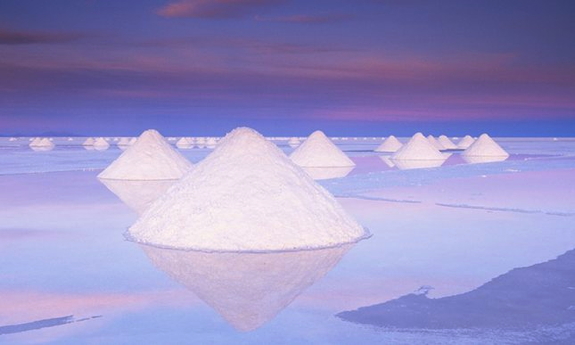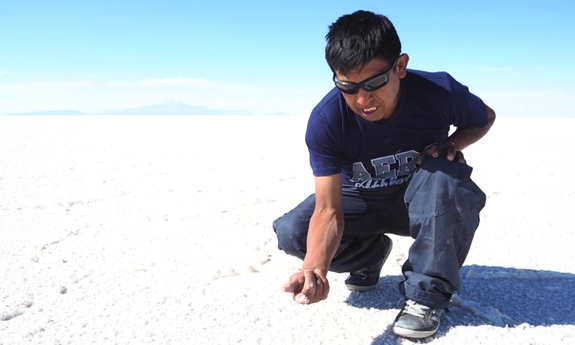
(above) Bolivia's lithium carbonate contains high levels of magnesium, making the extraction process difficult and costly. Photograph: Alamy
Electric car boom fuels interest in Bolivia's fragile salt flats
January 17, 2017 - theguardian.com
Demand for the metal used in electric car batteries has surged. But extraction could threaten the fragile ecosystem of the world's largest salt flat
Max Opray
In the middle of a vast salt desert in Bolivia, tour guide Angel Calani crouches down and jabs his index finger into the crusted earth. "Litio," he announces as he withdraws his finger, now glistening with brine. "We could mine it for a thousand years and not run out."
The 4,000-square-mile Salar de Uyuni is the world's largest salt flat and unexploited lithium reserve, with the metal sitting just a few centimetres below the surface.
Demand for lithium – which is used in pharmaceuticals, fertilisers, and smartphone and electric car batteries – has surged in the past year, ahead of an anticipated boom in electric cars, and is projected to outstrip supply by 2023.
The Bolivian government claims that it has 70% of the world's lithium reserves, piquing the interest of many international companies.
Supplying a raw material needed to develop the electric car industry will help to reduce reliance on fossil fuels, and could provide a much-needed economic boon for one of South America's poorest countries. But there are concerns about the impact of the extraction process on the desert's fragile ecosystem.
Extraction could mean increased traffic and pollution, pressure on water supply and damage to the site's natural beauty, affecting tourism.

(below) Locals, including tour guide Angel Calani, are concerned about the environmental impact of extracting lithium. Photograph: Max Opray
Luis de la Barra is a tour operator based in Uyuni, a busy tourist hub on the edge of the salt flats and the closest town to the 400 sq km portion of the Salar designated for lithium development. He says there have been few signs of lithium activity in the area so far, but worries about big machines digging up the Salar. "I'm concerned they will destroy the area and the environment," he says. "People from Uyuni are not going to be happy with that."
Back in the desert, the brine dripping off Calani's finger does not just contain lithium, but high levels of magnesium and other elements. This makes it more difficult and costly to process than the purer lithium reserves found in neighbouring Argentina and Chile.
These countries – which along with Bolivia are described as the lithium triangle – have been busily harvesting their salt flats to meet demand. After Australia, Chile is the second largest producer in the world and Argentina is third.
At the moment, Bolivia's salt plain is a shimmering white elephant, with just a few pilot extraction projects under way. These include a lithium carbonate project spearheaded by German company K-UTEC Ag Salt Technologies and a battery manufacturing plant built by China's Linyi Dake Trade.
Bolivia's president, Evo Morales, pledged to develop the country's lithium industry as part of his 2009 re-election campaign. He has since made a series of pledges to invest a total of $995m by 2019. The government has spent $250m of that sum so far, according to a report from Belmont Resources.
Tesla's reported interest
Morales has been less keen about involving international companies. At the start of his presidency, he declared an end to the "looting" of the country's resources by foreign countries. He has imposed strict requirements on foreign investment, demanding that the Bolivian government serve as an equal partner in any project processing and manufacturing products made from its lithium.
The country seems to be warming to international investment, however. In November last year, Luis Alberto Echazu, head of Bolivia's national lithium company Comibol, announced he was in discussions with an unnamed Canadian company about setting up a lithium battery plant in the country. In a report on its website, Comibol said Tesla expressed an interest in building a plant in Bolivia.
Industry observers suspect Pure Energy Minerals, a lithium supplier for Tesla, is the Canadian organisation in question. Sources have confirmed to the Guardian that Pure Energy Minerals is interested in the Bolivian lithium industry. Comibol and Tesla have not responded to requests for comment.
Patrick Highsmith, chief executive of Pure Energy Minerals, says he cannot confirm or deny involvement because of Canadian stock market regulations. But in answer to concerns about the extraction processes used, he says his company is experimenting with a lithium extraction process developed in Israel and particularly suited to the challenges of the Salar de Uyuni.
The process involves passing the brine through nano filters and mixing it with a solvent to separate the lithium from the other minerals. Once the lithium is extracted, the brine is reinjected back into the ground.
"If we can get in there and tinker with the process a little, the team believes it has applicability to the Bolivian salar," says Highsmith, who adds that it is less water-intensive than traditional methods of extracting lithium, employed by K-UTEC Ag Salt Technologies, that use the sun to evaporate the water from the brine, extracting the lithium from the leftovers.
However, Heiner Marx, director of K-UTEC Ag Salt Technologies, dismisses concerns about the water-intensity of the process. "We evaporate only the brine from the Salar, not the drinking water from the communities around," he says.